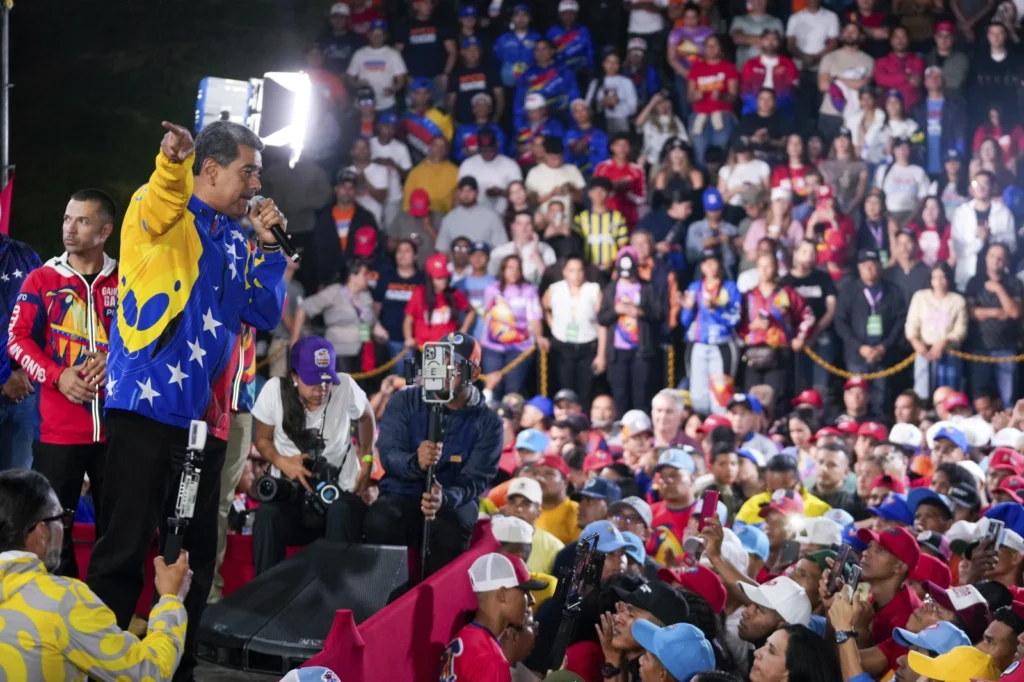
Key Points of the Venezuelan Election Update:
- Election Significance:
- The election could end 25 years of single-party rule.
- President Nicolás Maduro is seeking a third term.
- Edmundo González, a retired diplomat, is the main challenger.
- Opposition’s Claims:
- Opposition leaders celebrate a claimed landslide victory for González.
- Venezuelan law prohibits exit polls, leading to uncertainty.
- Maduro’s Campaign:
- Maduro’s campaign urged patience as voting centers stayed open past closing.
- Maduro’s allies projected confidence despite opposition claims.
- Public Sentiment:
- Voters expressed a mix of hope and desperation, some considering emigration if Maduro won.
- The election day saw high voter turnout and a desire for change.
- International Reactions:
- U.S. Vice President Kamala Harris urged respect for Venezuelan voters’ will.
- Concerns over the fairness and credibility of the election process.
- Historical Context:
- The election coincided with Hugo Chávez’s 70th birthday.
- Chávez’s Bolivarian revolution left a struggling nation under Maduro.
- Economic Conditions:
- Despite promises, many Venezuelans see no improvement in quality of life.
- The country faces severe economic challenges, including hyperinflation and emigration.
CARACAS, Venezuela (AP) — Venezuelans anxiously awaited the results of Sunday’s presidential election, which could end 25 years of single-party rule. President Nicolás Maduro, seeking a third term, faced a tough challenge from Edmundo González, a retired diplomat and last-minute stand-in for opposition leader Maria Corina Machado.
Opposition leaders celebrated what they claimed was a landslide victory for González, despite Venezuelan law prohibiting exit polls. Merling Fernández, a 31-year-old bank employee, expressed joy, seeing this as the path to a new Venezuela. Maduro’s campaign chief, Jorge Rodriguez, maintained a confident front, urging patience as voting centers remained open hours past the closing deadline.
Machado, blocked from running, received official voting tallies indicating a record turnout, which the opposition needed to overcome Maduro’s stronghold. U.S. Vice President Kamala Harris expressed support for Venezuelans, urging respect for their will.
Maduro’s allies projected confidence, with his son calling it a victory for the people. Voters, some lining up before dawn, shared water, coffee, and snacks as they awaited their turn.
Sunday’s election coincided with what would have been former President Hugo Chávez’s 70th birthday. Chávez’s Bolivarian revolution left a struggling nation in Maduro’s hands. Despite economic promises and a projected 4% growth this year, many Venezuelans saw no improvement in their quality of life, with wages remaining low and basic staples unaffordable.
Judith Cantilla, 52, voted for change, hoping for jobs, security, and better living conditions. Others, like Liana Ibarra, considered emigration if Maduro won, reflecting the desperation of many Venezuelans.
The opposition campaigned on addressing vast inequalities and promising sufficient jobs to entice expatriates to return. González called for the armed forces to respect the people’s decision, expressing hope and determination for change and reunification of families.
Venezuelans anxiously await the results of a crucial presidential election after casting their votes on Sunday. Analysts say President Nicolas Maduro, in power since 2013, faces one of his greatest political challenges. People lined up at polling centers at dawn, and voting continued throughout the day, though it remains unclear when the electoral authorities will announce the results.
As night fell, concerns grew over the fairness of the contest, given Maduro’s control over public institutions and accusations of previous vote rigging. Opposition party representatives were expected to ensure fairness at polling stations, but opposition witness Delsa Solórzano reported being denied access to the National Electoral Council (CNE) as it collates results in Caracas. Solórzano also claimed the CNE had stopped sending voting data from polling stations to prevent further vote processing.
Maduro is seeking a third consecutive six-year term, with his main challenger being the unified opposition movement, the Democratic Unitary Platform. The vote comes at a critical time for Venezuela, which has experienced violent repression and the worst economic collapse of a peacetime country in recent history. The once oil-rich nation has seen its economy shrink drastically over the last decade.
Punishing sanctions by the United States and European Union have failed to unseat Maduro, who blames Venezuela’s woes on an “economic war.” Around eight million Venezuelans have fled the country due to shortages and soaring inflation, with more likely to leave if Maduro wins. Opposition leader Maria Corina Machado claims an opposition victory would bring millions of Venezuelans back home.
On Sunday, some voters in Caracas expressed optimism for change. “After 25 years, I see a real chance to change,” voter Mariana Schemel said. “I’m doing this for my children and grandchildren,” added Amelia Perez, who has three sons, one living in Washington, D.C. “I want him to come back, and I don’t want my children to leave.”
Venezuela’s opposition claimed victory in Sunday’s presidential election, despite President Nicolás Maduro being declared the winner by the National Electoral Council. Opposition candidate Edmundo González and leader Maria Corina Machado cited tallies from 40% of ballot boxes indicating an overwhelming victory for González. However, the council reported Maduro securing 51% of the vote to González’s 44%, without releasing detailed tallies, causing foreign leaders to withhold recognition.
U.S. Secretary of State Antony Blinken and Chilean President Gabriel Boric expressed concerns over the credibility of the results. The six-hour delay in announcing results suggested internal debates within the government. Maduro, in his celebration, accused foreign enemies of attempting to hack the voting system, promising justice for those causing unrest.
Voters began lining up before dawn, hopeful for change after years of economic hardship under Maduro’s rule. The election coincided with what would have been the 70th birthday of former President Hugo Chávez. Maduro’s pitch to voters focused on economic security, despite the country’s severe economic collapse, hyperinflation, and widespread emigration.
The opposition, unified behind González, campaigned on promises to restore democracy and attract Venezuelans living abroad back home. The ballot also included eight other candidates, but only González posed a significant challenge to Maduro. After voting, Maduro stated he would recognize the election result and urged others to do the same, asserting no one would create chaos in Venezuela. The opposition’s celebration and claims of victory set the stage for potential unrest and a prolonged dispute over the election’s outcome.
Large crowd rallies in Humboldt Park as Venezuelans await results in tense presidential electionCHICAGO (WLS) — A celebration got underway in Chicago’s Humboldt Park neighborhood on Sunday night as people await the results of the Venezuelan presidential election.Earlier Sunday, people rallied downtown as Venezuelans cast their votes.
Whether it is President Nicolás Maduro who is chosen, or his main opponent, former diplomat Edmundo González, the election will have ripple effects throughout the Americas.
U.S. Sen. Dick Durbin posted about the election on X, formerly known as Twitter, saying, “Venezuelans showed up in huge numbers to vote for a better future. The regime must respect their votes and not steal another election.”Seven-point-seven million Venezuelans have already left the country in search of opportunities abroad.
Many of them have come to the United States, inflicting a migrant disaster which impacted Chicago whilst busloads of migrants had been despatched to the town from the Texas border.
In a contentious Venezuelan election, President Nicolás Maduro was declared the winner, despite exit polls indicating opposition candidate Edmundo González Urrutia had garnered more votes. This result is significant due to warnings from the opposition and NGOs about potential government interference, as Maduro sought a third term amidst widespread economic and democratic decline.
Polls consistently showed González with a substantial lead. Political instability, coupled with worsening economic and safety conditions, has driven millions of Venezuelans to seek refuge at the U.S.-Mexico border in recent years. Elvis Amoroso, head of the electoral commission CNE and a Maduro ally, announced after midnight that Maduro had secured 51% of the vote, with González receiving 44%. The opposition claimed their observers were unable to verify counts at some sites, while independent exit polls suggested González had received twice as many votes as Maduro.
At a Monday news conference, González pledged to fight until the will of the Venezuelan people was honored, declaring the results undeniable and advocating for peaceful change. Historical context reveals Maduro’s United Socialist Party of Venezuela (USPV) has been accused of past election interference, including arresting opposition workers, blocking international observers, expelling the UN’s Human Rights office, and banning key candidates.
Public confidence in Venezuelan elections is notably low, with only 26% of Venezuelans expressing trust in the honesty of elections according to a late 2023 Gallup poll. Additionally, 68% of respondents reported struggling to afford food, and 54% felt unsafe walking alone at night. Jesús Ríos, Gallup’s regional director for Latin America, noted the Maduro era has been marked by significant frustration among the population. This disputed election underscores the ongoing political and economic crises facing Venezuela.
